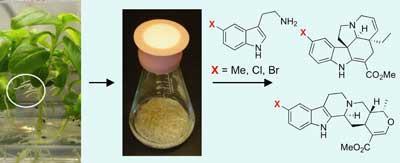Genetically modified periwinkles could one day function as medicine-making factories
Plants could one day function as factories for producing anti-cancer drugs, say US scientists. The researchers have engineered periwinkles to make novel compounds that are structural analogues of promising drug candidates.
Periwinkles naturally produce a number of alkaloid compounds with pharmaceutical activity, including anti-cancer activity. But by genetically modifying a key enzyme in the biosynthetic pathway for these compounds, researchers were able to produce a range of halogenated alkaloids that aren’t produced in nature. Their strategy could help expand the range of available drug candidates for a wide range of diseases.

Weerawat Runguphan and Sarah O’Connor of the Massachusetts Institute of Technology reprogrammed plant cells to produce a modified version of the enzyme strictosidine synthase. When non-natural halogenated substrates were fed to a cell culture of the modified plant’s hairy roots, the new enzyme, unlike its native counterpart, was able to transform the substrates into novel alkaloids.
’Similar strategies have proven to be very successful in making interesting new compounds in microbial culture, so we really wanted to see if it would work in plant cell culture,’ says O’Connor. ’And it does.’
While scientists have previously fed modified substrates to plant enzymes in the hope of creating novel products, O’Connor is the first to genetically manipulate plant metabolism for the purpose. Modifying plant metabolism is more of a challenge than for microbes because their pathways are more complicated - and there are large chunks of the alkaloid biosynthetic pathway for which there is little information, says O’Connor. In the past, she adds, people have also been reluctant to work with plants because the whole process is more time consuming.
’What they’ve done is more creative than what has been done before and allows for the production of a wider variety of compounds,’ says Toni Kutchan, an expert in plant metabolic engineering at the Donald Danfort Plant Science Center in St Louis. She adds that because this particular biosynthetic pathway is not well characterised it wouldn’t be possible to do this in bacteria.
The team have yet to carry out rigorous structural analysis of their products, but based on initial results from liquid chromatography mass spectrometry, they have identified various non-natural alkaloids, including chlorinated analogues of ajmalicine, which is used to treat hypertension, and tabersonine. The addition of the halogen could be important for creating new drug candidates. ’The nice thing about the halogen is that we could potentially use that as a handle for subsequent chemical modifications,’ says O’Connor.
Periwinkle’s main pharmaceutical product is the anti-cancer drug vinblastine - but this is only made by the intact plant, and is not produced in cell culture. Making unnatural vinblastin analogues is the next stage, according to O’Connor - but this will mean engineering the plant so that it can generate the unnatural substrates itself. However, she says that simpler serpentine alkaloids, which are also thought to have anti-cancer activity, could be produced in culture.
Hayley Birch
Enjoy this story? Spread the word using the ’tools’ menu on the left.
References
Nature Chemical Biology, 2009, DOI: 10.1038/nchembio.141






No comments yet